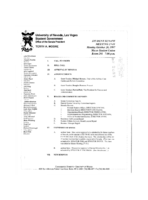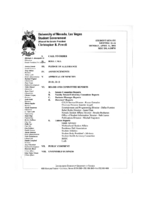Search the Special Collections and Archives Portal
Search Results
UNLV Libraries Collection of MGM Mirage Corporation Promotional Materials and Reports
Identifier
Abstract
The UNLV Libraries Collection of MGM Mirage Corporation Promotional Materials and Reports includes promotional materials, newspaper and magazine clippings, financial reports, annual reports, diversity reports, press releases, and press kits for the MGM Mirage Corporation in Las Vegas, Nevada, dating from 1973 to 2007.
Archival Collection
Charles Vanda Photograph Collection
Identifier
Abstract
The Charles Vanda Photograph Collection, approximately 1960 to 1988, contains black-and-white and color photographic prints with some corresponding negatives of Charles Vanda with colleagues and friends from the University of Nevada, Las Vegas (UNLV). The images depict Vanda at UNLV sporting events, graduation ceremonies, and other campus events. Also included are some images from fellow musicians, entertainers, and producers associated with Vanda.
Archival Collection
Richard B. Taylor Photograph Collection
Identifier
Abstract
The Richard B. Taylor Photograph Collection (approximately 1957-1991) consists of black-and-white and color photographic prints and negatives. The images depict Taylor alongside Pi Kappa Alpha fraternity brothers playing table games and seated at a bar inside the Arizona Club in Las Vegas, Nevada. Additional images portray Taylor’s home on Trotter Circle in Las Vegas decorated for Halloween.
Archival Collection
Blanche Zucker-Bozarth Photograph Collection
Identifier
Abstract
The Blanche Zucker-Bozarth Photograph Collection contains black-and-white and color photographic prints, negatives, and slides of Blanche Zucker-Bozarth between approximately 1980 and 2000. These images depict Zucker-Bozarth attending University Library Society gatherings at the University of Nevada, Las Vegas (UNLV), community fundraisers and events, and award ceremonies. During University Library Society gatherings, Zucker-Bozarth is seen with UNLV Libraries and campus-level administrative faculty and associates. The collection also contains Zucker-Bozarth attending events for the WE CAN (Working to Eliminate Child Abuse and Neglect) Fundraiser and the President’s Child Safety Partnership. Other photographs include Zucker-Bozarth holding the Chicago Award, Zucker-Bozarth posed with Mesquite Club members, and various individuals in Las Vegas and Carson City, Nevada.
Archival Collection
Sister Rosemary Lynch Photograph Collection
Identifier
Abstract
The Sister Rosemary Lynch Photograph Collection contains color photographs featuring or pertaining to Sister Rosemary Lynch participating in nuclear weapons protests at the Nevada Test Site and in international locations (approximately 1980-2002).
Archival Collection

Transcript of interview with Roy Brown by Rick Godwin, May 21, 1976
Date
Archival Collection
Description
Text

James Matson interview, February 23, 1980: transcript
Date
Archival Collection
Description
On February 23, 1980, Ken Rose interviewed James Matson (b. July 14, 1923 in Pensacola, Florida) about his life in Las Vegas, Nevada. Throughout the interview, Matson discusses his childhood, life in Florida before moving to Las Vegas, his family and what brought him to Las Vegas. Matson also delves into his economic struggles and those of the community, his attempt to purchase a home and the changes he would like to see in society. Moreover, Matson talks about his hobbies, his work in construction and interracial friendships. The interview ends with Matson discussing the city of Las Vegas, the weather and the changing buildings.
Text

Meeting minutes for Consolidated Student Senate University of Nevada, Las Vegas, October 20, 1997
Date
Archival Collection
Description
Text

Meeting minutes for Consolidated Student Senate, University of Nevada, Las Vegas, April 14, 2003
Date
Archival Collection
Description
Text

Meeting minutes for Consolidated Student Senate, University of Nevada, Las Vegas, September 27, 1983
Date
Archival Collection
Description
Text
